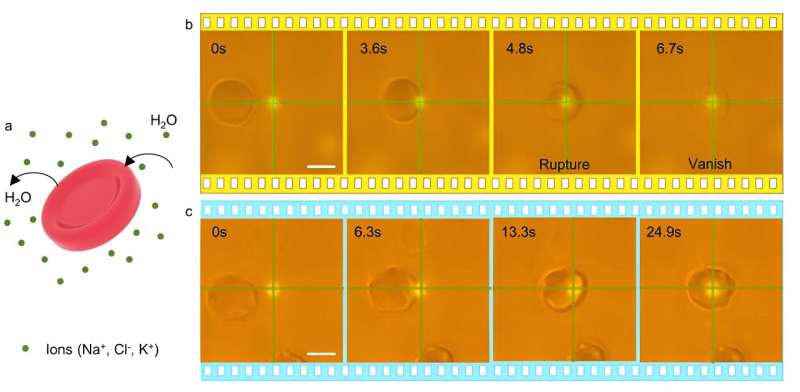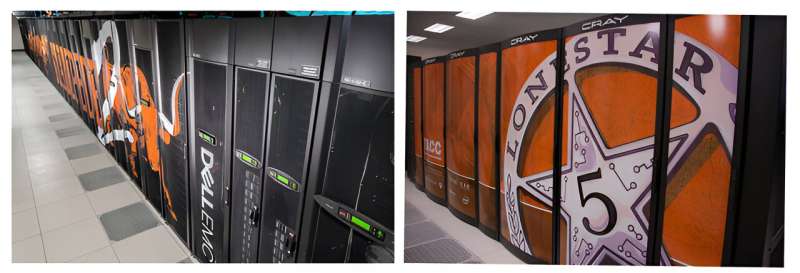This article has been reviewed according to Science X's editorial process and policies. Editors have highlighted the following attributes while ensuring the content's credibility:
fact-checked
peer-reviewed publication
trusted source
proofread
Scientists use supercomputers to make optical tweezers safer for living cells

Optical tweezers manipulate tiny things like cells and nanoparticles using lasers. While they might sound like tractor beams from science fiction, the fact is their development garnered scientists a Nobel Prize in 2018.
Scientists have now used supercomputers to make optical tweezers safer to use on living cells with applications to cancer therapy, environmental monitoring, and more.
"We believe our research is one significant step closer towards the industrialization of optical tweezers in biological applications, specifically in both selective cellular surgery and targeted drug delivery," said Pavana Kollipara, a recent graduate of The University of Texas at Austin.
Kollipara co-authored a study on optical tweezers published August 2023 in Nature Communications, written just before he completed his Ph.D. in mechanical engineering under fellow study co-author Yuebing Zheng of UT Austin, the corresponding author of the paper.
Optical tweezers trap and move small particles because light has momentum, which can transfer to an impacted particle. Intensified light in lasers amps it up.
Kollipara and colleagues took optical tweezers one step further by developing a method to keep the targeted particle cool, using a heat sink and thermoelectric cooler. Their method, called hypothermal opto-thermophoretic tweezers (HOTTs), can achieve low-power trapping of diverse colloids and biological cells in their native fluids.
This latest advancement could help overcome problems with current laser light tweezers because they scorch the sample too much for biological applications.
"The main idea of this work is simple," Kollipara said. "If the sample is getting damaged because of the heat, just cool the entire thing down, and then heat it with the laser beam. Eventually, when the target such as a biological cell gets trapped, the temperature is still close to the ambient temperature of 27–34 °C. You can trap it at lower laser power and control the temperature, thereby removing photon or thermal damage to the cells."
The science team tested their HOTT on human red blood cells, which are sensitive to temperature changes.
"Using conventional optical tweezers, the cell structure is damaged and they die immediately. We have demonstrated that, no matter what kind of solution the cells are dispersed in, our technique can safely trap and manipulate them. That was one of the major findings in the study," Kollipara said.
Another finding applies to drug delivery applications. Plasmonic vesicles, tiny gold nanoparticle-coated bio-containers, were trapped without being reputed moved to different locations inside a solution, analogous to guiding drugs to a targeted cancer tumor. Once they reach the cancer target, they are hit with a secondary laser beam to burst open the drug cargo.

"Laser induced drug delivery is important because we can focus and deliver drugs on a particular target. This way, the amount of drugs a patient consumes goes down significantly, and you can specify at what locations you can administer the drug," Kollipara added.
Supercomputer simulations were needed to compute full-scale 3D force magnitudes on the particles from the optical, thermalphoretic, and thermoelectric fields achieved at a particular laser power. While a Ph.D. student at UT Austin, Kollipara was awarded allocations on TACC's Stampede2, a national strategic resource shared by thousands of scientists.
"The system is so complex in terms of computational cost requirements that our local workstations cannot support it. We would need to run a simulation for days to achieve just one data point, and we need thousands. TACC has helped us in our analysis and generates results orders of magnitude faster than anything else that we have," Kollipara said.
More broadly and not directly for this study, Kollipara's plasmic biosensor research has also used TACC's Lonestar5 system to run more extensive simulations. Lonestar5, and now Lonestar6 specifically serve scientists in the UT System through the University of Texas Research Cyberinfrastructure (UTRC).
"Building a complicated model alone is not enough," Kollipara said. "You need to ensure that it is running properly through experimentation. Laptop computers are not sufficient for the needs of hardcore research and development. That's where supercomputing resources like those at TACC help researchers push research and development as fast as possible and keep up with human needs."
More information: Pavana Siddhartha Kollipara et al, Hypothermal opto-thermophoretic tweezers, Nature Communications (2023). DOI: 10.1038/s41467-023-40865-y
Journal information: Nature Communications
Provided by University of Texas at Austin





















